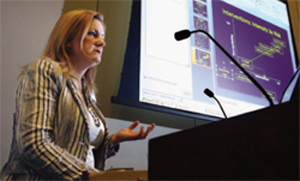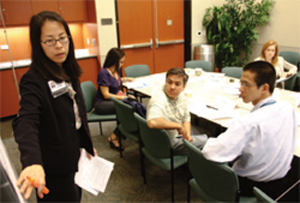
Michael Scheurer chose his research path — the viral causes of cancer — soon after finishing a master’s degree in public health. He took further steps in that direction when he completed his doctoral and post-doctoral training. But what really sealed his career as a well-funded epidemiologist was acceptance into MD Anderson’s Cancer Prevention Research Training Program (CPRTP).
“This program provided an experience that is well above and beyond what most epidemiologists have the opportunity to attend,” says Scheurer, Ph.D., now an assistant professor in the Dan L. Duncan Cancer Center at Baylor College of Medicine. “The best part of the program was interaction with my mentors, Dr. Melissa Bondy and Dr. Randa El-Zein, who provided the intellectual stimulation that I needed to begin developing my ideas and prepare me for a future in cancer prevention research. I could hit the ground running when I joined Baylor.”
Scheurer is just one of many scientists working in cancer prevention around the globe who have taken part in this program, whose goal is to help prepare scientists and clinicians for leadership roles as research investigators in cancer prevention and control.
“The high standards established for trainees in this program help fellows launch their careers in externally funded, peer-reviewed research,” says Robert Chamberlain, Ph.D., founder of CPRTP, professor in the Department of Epidemiology and a University of Texas System Distinguished Teaching Professor.
Multidisciplinary track enhances training
Following the institution’s successful road map in multidisciplinary cancer treatment methods, the training program covers three levels of prevention: primary prevention, which focuses on avoiding risks through behaviors such as smoking cessation and eating a healthy diet; secondary prevention, which includes screening; and tertiary prevention, or prevention of new or recurring cancers in survivors. Tertiary prevention also addresses minimizing side effects of treatment and enhancing quality of life for cancer survivors.

Carrie Cameron, Ph.D., discusses possible
interventions for cancer prevention and how
people might perceive the risks involved.
Established in 1992, the program has trained more than 350 fellows and follows a comprehensive curriculum that captures their areas of interest and other disciplines targeting cancer prevention. The program is the largest and one of the oldest cancer prevention training programs operating in the United States.
The key component of the program, contributing to trainee success, is the pairing of the trainee with at least two mentors from different disciplines — established faculty members who are considered experts in the trainee’s fields of interest.
“Fostering the relationship between trainees and their mentors is an invaluable and unique part of the program,” says Carrie Cameron, Ph.D., instructor and associate director of the program.
Solid funding and support
This year marks the program’s 18th year of funding from the National Cancer Institute. In fact, CPRTP is the recipient of one of the largest NCI training grants awarded in the United States.

Shine Chang, Ph.D., director of the Cancer Prevention
Research Training Program, helps students brainstorm
content for a research paper detailing their work.
The program’s ambitious curriculum and multidisciplinary track also have attracted several philanthropic supporters, including Halliburton. Plus, its deep expertise in graduate and early career research training has been instrumental in the successful development of the Duncan Family Institute’s Mentored Junior Faculty Fellowship Program.
Other opportunities through the training program include short-term research experiences for undergraduate and graduate students, trainee forums and special presentations, and new interdisciplinary classes focusing on bio-behavioral research methods.
“We have faculty who love our fellows and want more of them,” says Shine Chang, Ph.D., professor in the Department of Epidemiology. As director of CPTRP, she mentors trainees and junior faculty, helping them develop their careers, find opportunities to showcase their research and write grants to obtain independent funding for their research. “We are well connected with cancer prevention research, and we’ve developed an informal network around the United States that allows us to place and keep track of all our graduates.”
Daniel Hughes, Ph.D., assistant professor in the Department of Epidemiology and Biostatistics at the Institute of Health Promotion Research in San Antonio and another graduate of the training program, can’t say enough good things about the program. “It helped me develop essential skills like writing, managing projects and how to assume a leadership role — both in and out of the lab.”
Extras abound for students
Other educational tools and extras offered to trainees through the Cancer Prevention Research Training Program include:
- A personalized educational plan
- Career guidance and development plan
- Scientific and grant writing courses
- Opportunities to present research to professional and lay audiences
- Coaching and assistance with mentor relationship development
- Other professional development activities

















